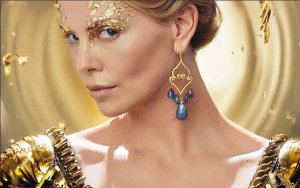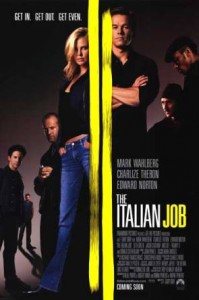In polite society no one would dare ask a stranger about his or her father’s violent death, but celebrity culture is not polite society.
Over the years I’ve heard interviewers ask questions ranging from the innocuous — “What are you wearing?” — to the silly — “How do you keep your bum in such great shape?” — but rarely have I heard anything as unnecessarily meddling as the query aimed at Charlize Theron during a press conference I hosted several years ago.
A reporter asked the actress about seeing her mother shoot her abusive, alcoholic father dead when she was a teenager. But instead of breaking down Theron said, “I’m not talking about that,” with an icy finality that made everyone freeze.
I admired her for not over sharing, not spilling the intimate details of her life à la the Kardashian Klan. She’s careful what she says to the press, avoids scandal and damage controls the ones that inevitably pop up in every celeb’s life. For instance, recently she said, short and sweetly, “We both decided to separate,” when accused of “ghosting” on her romance with Sean Penn.
She understands some things should only be spoken about when and where she chooses and not at the behest of an aggressive reporter looking to dredge up painful memories for the sake of “good television.” Theron is media savvy so I was surprised a few weeks ago when she caused a media hurly burly with comments about the burden of being beautiful.
Chatting up her new film The Huntsman: Winter’s War with British GQ she said, “How many roles are out there for the gorgeous, BLEEPINGing, gown-wearing eight-foot model? When meaty roles come through, I’ve been in the room and pretty people get turned away first.”
She is a beautiful woman, that is as clear as the perfectly positioned nose on her face, but is she intimating that being beautiful has harmed her career?
Turns out she wasn’t, or so she claims. Alleging a misquote, she later apologized, saying that playing “deconstructed characters” appeals because, “how many characters really are there out there for a woman wearing a gown? You have to play real people.
The mea culpa was unnecessary. She works in a business where beauty is a commodity.
The problem with her earlier statement is that publicly acknowledging one’s own looks carries with it a hint of arrogance, a suggestion that winning the genetic lottery somehow makes you superior, but she simply said something others already have.
Keira Knightley claims she almost lost the role in Pride and Prejudice because the director thought she was too pretty and Jessica Biel says being Esquire’s 2005 Sexiest Woman cost her work.
Theron may have missed out on a job or two because of her looks, but it’s also an element of what made her a star.
That and talent, and just as you wouldn’t apologize for skin colour or having red hair or being tall or short, she doesn’t need to say sorry for being beautiful.
 Richard looks at the five best and most unusual movie getaway cars of all time!
Richard looks at the five best and most unusual movie getaway cars of all time!


